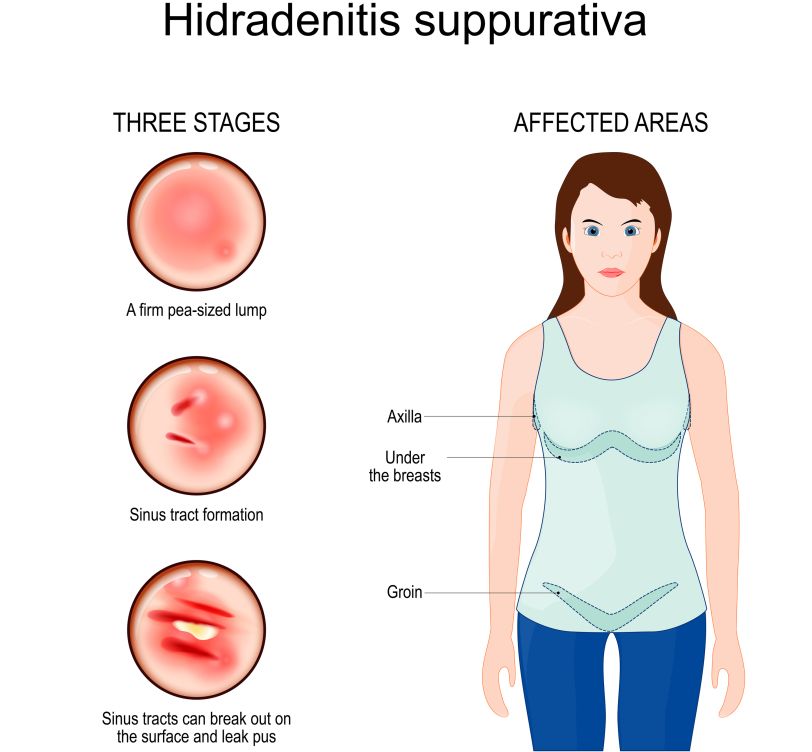Request A Consultation
What is Hidradenitis suppurativa?
Hidradenitis suppurativa is a chronic inflammatory skin condition characterized by recurrent painful nodules, abscesses, and sinus tracts that can lead to scarring and cosmetic deformities. Though the cause of Hidradenitis suppurativa is still unknown, it is thought to be caused by the blockage of hair follicles and specialized sweat glands known as apocrine glands. Areas with high densities of apocrine glands include the armpits, the groin, and under the breast. Additionally, certain environmental and behavioral factors, such as smoking and obesity, can contribute to disease severity and exacerbate symptoms.

What are the symptoms of hidradenitis suppurativa?
- Painful and recurrent nodules, abscesses, and tunnels under the skin
- Formation of small, tender bumps that enlarge and become painful over time
- Presence of large, inflamed, and pus-filled lumps
- Itching and burning sensations in the affected areas
- Foul-smelling discharge from the bumps and abscesses
- Skin ruptures, leading to the formation of open sores
- Intertrigo rash to the armpits, groin, lower abdomen, buttocks, and under the breasts
- Commonly occurs in areas where skin rubs together, such as armpits, groin, buttocks, and under the breasts
- Severe impact on the individual’s quality of life, including social and emotional challenges

How is Hidradenitis suppurativa treated?
Treatment options for hidradenitis include medical management with antibiotics, corticosteroids, and immune-suppressing agents, as well as surgical intervention. Surgery is often a definitive treatment for Hidradenitis when medical treatments have not been helpful. Some patients often try medications such as Humira, Infliximab, Spironolactone, and Remicade but do not see improvement in their symptoms.
What are the indications for treating hidradenitis suppurativa with surgery?
Surgical intervention is recommended for patients with moderate to severe hidradenitis who have failed medical management or who have recurrent disease. Surgery may also be considered a first-line treatment for patients with extensive disease or those who have significant cosmetic deformities or functional impairments. Many patients may have an intertrigo rash and may be candidates for skin excision or a tummy tuck, depending on the affected area.
Hidradenitis suppurativa surgery with Dr. Azouz can offer several benefits, including:
- Removal of abscesses, tunnels, and scar tissue, providing relief from painful symptoms.
- Reducing the risk of infection and preventing recurrent flare-ups.
- Improving the cosmetic appearance of affected areas, enhancing self-esteem and confidence.
- Enhancing mobility and overall quality of life for patients
What should I do before surgery for hidradenitis suppurativa?
Before surgery, patients should undergo a thorough medical history and physical examination, including laboratory studies, to rule out any underlying autoimmune or infectious disorders that may contribute to the disease.

How is hidradenitis suppurativa treated with surgery?
There are several surgical techniques that can be used to treat hidradenitis:
- Incision and Drainage: This involves making a small incision in the affected area to drain any abscesses or pus. This can provide temporary relief from pain and swelling but may not be effective in definitely treating the underlying diseased tissue.
- Excision: This involves removing the affected tissue, including any nodules or sinus tracts. The wound is closed with sutures or left open to heal by secondary intention. This technique can be effective in treating early-stage disease or isolated nodules but may be less effective in treating extensive disease.
- Laser Therapy: This involves using a laser to destroy the affected tissue, including any nodules or sinus tracts. This technique can be effective in treating early-stage disease and may have fewer side effects than excision but may not be effective in treating extensive disease.
- Skin Grafting: This involves taking a piece of skin from another part of the body and grafting it onto the affected area. This technique can be effective in treating extensive disease or areas of scarring or deformity, but it may require multiple surgeries and have a longer recovery time.
What is the anesthesia for hidradenitis suppurativa surgery?
Board-certified plastic surgeon Dr. Azouz uses local anesthesia with sedation to provide his patients with a comfortable surgical experience and to help with pain and discomfort.
What are the risks of hidradenitis suppurativa surgery?
As with any surgical procedure, there are risks associated with HS surgery, including infection, bleeding, scarring, and wound healing issues. Dallas plastic surgeon Dr. Azouz will go over these risks with each patient and take the necessary precautions to minimize complications.

What can I expect after surgery for Hidradenitis suppurativa?
After surgery, patients are monitored for signs of infection. Patients are also advised to keep the surgical site clean and dry and to avoid any strenuous activity or excessive sweating until the wound has fully healed.
Patients are followed up regularly to monitor for recurrence or surgical complications. Patients should continue to maintain good hygiene and avoid any potential triggers that may exacerbate the disease.
After surgery, board-certified plastic surgeon Dr. Azouz will monitor for signs of infection and ensure proper wound healing during routine follow-up visits. Dr. Azouz recommends keeping the surgical site clean and dry and avoiding any strenuous activity or excessive sweating until the wound has fully healed.
Hidradenitis Suppurativa in Dallas
Hidradenitis suppurativa surgery has a number of advantages for people who suffer from this chronic skin condition. Surgical interventions can effectively remove abscesses, tunnels, and scar tissue, relieving pain and reducing infection risk. Additionally, surgery can help improve the cosmetic appearance of affected areas, boosting patients’ self-esteem and confidence. In cases of advanced or severe HS, surgical procedures such as wide excision or skin grafting may be recommended to remove large, persistent lesions, resulting in a better overall quality of life and increased mobility for the individual. If you are seeking relief from hidradenitis suppurativa, call (972) 702-8888 to schedule a consultation with board-certified plastic surgeon Dr. Azouz today to explore your treatment options and regain your confidence.